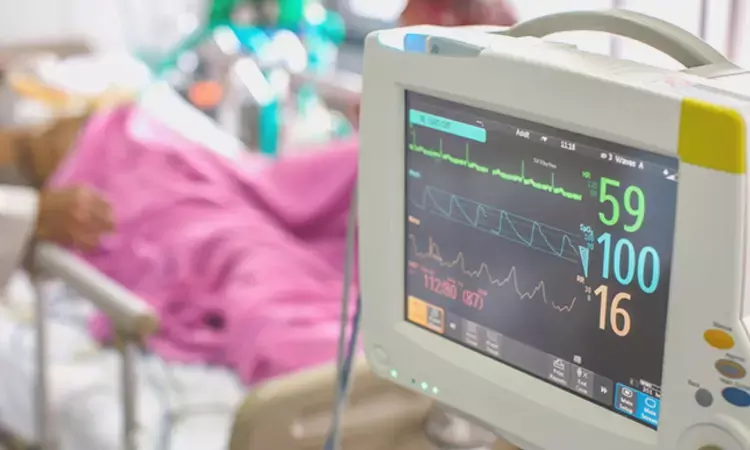- Home
- Medical news & Guidelines
- Anesthesiology
- Cardiology and CTVS
- Critical Care
- Dentistry
- Dermatology
- Diabetes and Endocrinology
- ENT
- Gastroenterology
- Medicine
- Nephrology
- Neurology
- Obstretics-Gynaecology
- Oncology
- Ophthalmology
- Orthopaedics
- Pediatrics-Neonatology
- Psychiatry
- Pulmonology
- Radiology
- Surgery
- Urology
- Laboratory Medicine
- Diet
- Nursing
- Paramedical
- Physiotherapy
- Health news
- Fact Check
- Bone Health Fact Check
- Brain Health Fact Check
- Cancer Related Fact Check
- Child Care Fact Check
- Dental and oral health fact check
- Diabetes and metabolic health fact check
- Diet and Nutrition Fact Check
- Eye and ENT Care Fact Check
- Fitness fact check
- Gut health fact check
- Heart health fact check
- Kidney health fact check
- Medical education fact check
- Men's health fact check
- Respiratory fact check
- Skin and hair care fact check
- Vaccine and Immunization fact check
- Women's health fact check
- AYUSH
- State News
- Andaman and Nicobar Islands
- Andhra Pradesh
- Arunachal Pradesh
- Assam
- Bihar
- Chandigarh
- Chattisgarh
- Dadra and Nagar Haveli
- Daman and Diu
- Delhi
- Goa
- Gujarat
- Haryana
- Himachal Pradesh
- Jammu & Kashmir
- Jharkhand
- Karnataka
- Kerala
- Ladakh
- Lakshadweep
- Madhya Pradesh
- Maharashtra
- Manipur
- Meghalaya
- Mizoram
- Nagaland
- Odisha
- Puducherry
- Punjab
- Rajasthan
- Sikkim
- Tamil Nadu
- Telangana
- Tripura
- Uttar Pradesh
- Uttrakhand
- West Bengal
- Medical Education
- Industry
High rates of hyperglycemia episodes encountered early in patients admitted to ICU after cardiac surgery

Greece: A recent study published in the Journal of Cardiothoracic and Vascular Anesthesia has shed light on ICU hyperglycemia after cardiac surgery and associated clinical outcomes and risk factors.
The researchers revealed frequent occurrence of hyperglycemia in patients admitted to the cardiac surgery intensive care unit (ICU) after cardiac surgery. High EuroSCORE II, diabetes, and preoperative leukocytosis were found to be independent risk factors for postoperative hyperglycemia. European System for Cardiac Operative Risk Evaluation (EuroSCORE) II predicts the risk of in-hospital mortality after major cardiac surgery.
Hyperglycemia is associated with worse clinical outcomes, including a higher rate of ICU-acquired weakness and acute kidney injury, a higher rate of multiorgan failure, and a greater duration of mechanical ventilation.
Hyperglycemia patients face increased mortality and morbidity due to postoperative complications after cardiac surgery. Stavros Dimopoulos, Cardiac Surgery Intensive Care Unit, Onassis Cardiac Surgery Center, Athens, Greece, and colleagues aimed to evaluate the incidence of postoperative hyperglycemia, the hyperglycemia risk factors, and its association with clinical outcomes in patients admitted to the cardiac surgery ICU after cardiac surgery in a prospective, observational study conducted in a single-centre hospital.
The study included two hundred ten consecutive postoperative cardiac surgery patients admitted to the cardiac surgery ICU.
The researchers evaluated patients' blood glucose levels immediately after cardiac surgery and every 3 hours daily for 7 days or earlier upon discharge. The intravenous (IV) insulin was administered as per the institution's protocol. Perioperative predisposing risk factors were assessed for hyperglycemia and clinical outcomes.
The study led to the following findings:
- Postoperative hyperglycemia, defined as glucose level ≥180 mg/dL, occurred in 30% of cardiac surgery patients.
- Diabetes mellitus (odds ratio [OR] 6.73), white blood cell count (OR 1.28), and EuroSCORE II (OR 1.20) emerged as independent prognostic factors for hyperglycemia.
- Patients with glucose ≥180 mg/dL had higher rates of acute kidney injury (34.9% v 18.9%), longer duration of mechanical ventilation (959 v 720 min), and sedation (711 v 574 min), and higher levels of ICU–acquired weakness (14% v 5.5%) and rate of multiorgan failure (6.3% v 0.7%) compared with patients with glucose levels <180 mg/dL.
The findings showed that in the ICU, hyperglycemia occurs frequently in patients immediately after cardiac surgery. Preoperative leukocytosis, high EuroSCORE II, and diabetes are independent risk factors for postoperative hyperglycemia.
Hyperglycemia is associated with worse clinical outcomes, including a higher rate of acute kidney injury and ICU-acquired weakness, a higher rate of multiorgan failure, and a greater duration of mechanical ventilation.
Reference:
Kourek, C., Georgopoulou, M., Kolovou, K., Rouvali, N., Panoutsopoulou, M., Kinti, C., Soulele, T., Doubou, D., Karanikas, S., Elaiopoulos, D., Karabinis, A., & Dimopoulos, S. (2023). Intensive Care Unit Hyperglycemia After Cardiac Surgery: Risk Factors and Clinical Outcomes. Journal of Cardiothoracic and Vascular Anesthesia. https://doi.org/10.1053/j.jvca.2023.09.022
Dr Kamal Kant Kohli-MBBS, DTCD- a chest specialist with more than 30 years of practice and a flair for writing clinical articles, Dr Kamal Kant Kohli joined Medical Dialogues as a Chief Editor of Medical News. Besides writing articles, as an editor, he proofreads and verifies all the medical content published on Medical Dialogues including those coming from journals, studies,medical conferences,guidelines etc. Email: drkohli@medicaldialogues.in. Contact no. 011-43720751


